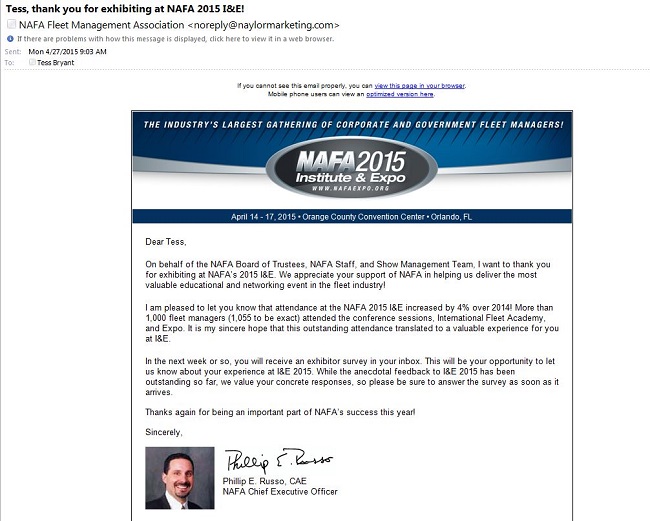The Power of Personalization in Event Marketing

Market smarter, not harder, simply by using fewer generic pronouns and more real names in your association’s communications. Here’s our successful experience with email personalization.
Traditional, cookie-cutter marketing campaigns don’t work anymore. Today, customers expect personalized content, and they have a low tolerance for anything that they consider looks remotely “spammy.”
In the marketing world of associations, it’s about relationships, and it’s about trust. One way associations build trust in marketing is to tailor communications to the individual. Personalized content means less irrelevant information for the member to sort through, which saves them time and patience and increases happiness, resulting in higher conversion rates. Most associations do not have the resources available to manually personalize every piece of communication, but personalization does not have to be expensive.
Most associations do not have the resources available to manually personalize every piece of communication, but personalization does not have to be expensive.
While there are many ways to create this personal connection to our members and customers, one of the simplest changes we have found to be effective is eliminating the use of generic pronouns and replacing them with personal names and company names.
Email personalization doesn’t have to be expensive.
Replace generic pronouns with personal names and company names, and see a lift in your email open and engagement rates.
Personalized, relevant messaging can deliver more than four times the response of generalized messaging.
What’s in a name?
Imagine: You’re at a basketball game surrounded by the sound of screaming fans, buzzers and sneakers squeaking on the court. Someone near you says your name in conversation, and immediately all those other louder sounds fade away and your attention hones in on that one conversation. People pay attention to their own names. It’s the strongest attention-grabber we experience.
This is what we want to do as marketers. We want customers to pay attention to our conversation in a sea of loud buzzers and screams.
In his book How to Win Friends and Influence People, Dale Carnegie wrote, “Remember that a person’s name is, to that person, the sweetest and most important sound in any language.” Carnegie believed that using a person’s actual name was a crucial factor in making that person like you.
This could not be more relevant to the marketing world. We want our customers to like us, so we can benefit from the positive response they have to seeing their own name. If and when that positive response gets imprinted with our messaging and company name … we’ve got them.

Our findings
Winning over someone simply by using his or her name may work in social situations, and it may work for general consumer marketing, but will it work with our exhibitor clients as we market our events? We decided to test it out to see for ourselves.
We sent exhibitor marketing emails for six different association trade shows in five different industries with an A/B test approach. Half received emails with generic pronouns in both the subject line and body text, while the other half saw emails addressed to them personally.
The result? Completely positive.
Like other studies have shown, there is a strong, positive correlation between using personalized text in emails and how many opens and clicks they receive.
For our personalized emails, we saw a 22 percent increase in unique opens and an 18 percent increase in total opens compared to the generic emails. The results for click-through rates were even more impressive: Unique clicks and total clicks were 34 percent and 37 percent higher, respectively, for personalized emails. We also saw our unsubscribe rate decrease by 20 percent for personalized email, which suggests more customers see value in receiving personalized emails verses generic, even if the only change is the pronoun used.
And while we have only tested this on our email marketing efforts so far, research from other companies suggest the same personalization effect applies to printed marketing mailings as well.
According to the 1-to-1 Response Rate Report published by Caslon and Co., personalized, relevant messaging can deliver more than four times the response of generalized messaging.
So it’s safe to say that personalized messaging is always a good idea for marketers, and it can give a substantial boost to a marketing campaign for which effectiveness has fallen flat over the years. Customers have come to expect personalization more and more.
How does this apply to marketing your association’s events?
Associations exist for the benefit of members, so all communications we send should clearly tell the people reading them that you are trying to help them. We need their trust. By using personal names and company names in our marketing, it helps our members and/or prospects feel a connection and/or friendship to us.
On this note, be sure to keep your data clean so that any personalization attempts actually work. Getting the recipient’s name or company incorrect, or repeatedly having to fall back on default greetings, such as “colleague,” because some of your records are incomplete will not go over well with your recipients and will quickly harm your open rates. HubSpot explains more in this article.
What do you need to make these changes happen?
Nearly every email marketing system today has the capability to use variable data tagging to pull personalized content from lists and insert those names into your emails. The main hurdle for most marketers is the list. The more info we have about each lead in a list, the more personalized your content can be. The basics you should have are first name, last name, company name and, of course, address. But the possibilities of personalization are endless with the more data you collect for each lead. Age, occupation, geographic location—all of these details can be used to target your customers more and more effectively.
How much should you invest in personalizing your marketing?
You, the marketer, will have to be the judge of that. Start small if you need to. Any type of personalization is always better than completely generic messaging any day.
Market smarter, not harder.
Tess Bryant is an Event Marketing Specialist with Naylor Event Solutions.



